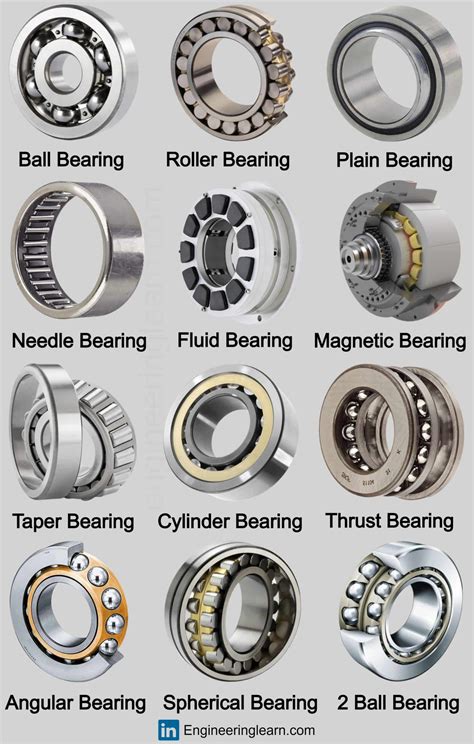Bearings: The Unsung Heroes of Modern Machinery
Introduction
Bearings are essential components of countless machines, from the humble electric fan to the colossal engines that power airplanes. They reduce friction, allowing parts to move smoothly and efficiently. While often overlooked, bearings play a critical role in the operation and longevity of machinery. This article will explore the world of bearings, including their types, applications, benefits, and importance.
Types of Bearings
There are various types of bearings designed to meet specific load, speed, and environmental requirements. Some common types include:
-
Plain bearings: Consisting of a shaft and a bearing surface that slide directly against each other. They are suitable for low-load applications.
-
Rolling bearings: Utilizing balls or rollers between the shaft and the bearing surface to reduce friction. They offer higher load capacity and can operate at higher speeds.
-
Hydrostatic bearings: Using fluid pressure to create a thin film between the shaft and the bearing surface, providing near-frictionless operation.
-
Magnetic bearings: Employing magnetic fields to levitate the shaft, eliminating friction and vibration.
Applications of Bearings
Bearings are indispensable in a wide range of industries and applications, including:

-
Automotive: Automobiles rely on bearings in engines, transmissions, wheels, and other components.
-
Industrial machinery: Manufacturing equipment, such as pumps, compressors, motors, and conveyors, requires bearings for smooth operation.
-
Aerospace: Bearings are crucial for aircraft engines, control systems, and landing gear.
-
Medical devices: Implantable devices, such as artificial joints, use bearings to reduce friction and improve mobility.
-
Consumer appliances: Bearings are essential in home appliances like refrigerators, washing machines, and dryers.
Benefits of Bearings
The use of bearings offers numerous benefits for machinery and equipment:
-
Reduced friction: Bearings minimize friction between moving parts, improving efficiency and reducing power consumption.
-
Increased longevity: By reducing wear and tear, bearings extend the lifespan of machinery and components.
-
Improved performance: Smooth and accurate operation of machinery is facilitated by bearings.
-
Noise reduction: Bearings help to dampen vibrations and noise, creating a more comfortable operating environment.
-
Lower maintenance costs: Regular maintenance of bearings is crucial for maintaining optimal performance and preventing failures.
Why Bearings Matter
Bearings are not merely components; they are essential for the efficient and reliable operation of machinery. Their importance lies in:

-
Safety: Bearings prevent breakdowns and accidents caused by bearing failures.
-
Performance: They ensure optimal performance and accuracy of machinery.
-
Reliability: Bearings increase the reliability of equipment, minimizing downtime and production losses.
-
Sustainability: By reducing friction, bearings contribute to energy savings and environmental sustainability.
Stories and Lessons
To illustrate the critical role of bearings, let's explore a few real-life stories and the lessons they teach:

-
The Broken Bearing: A manufacturing plant experienced a catastrophic equipment failure due to a faulty bearing. The resulting downtime cost the company millions of dollars in lost production. This incident highlights the importance of regular bearing maintenance and quality control.
-
The Smooth Operator: A high-speed train set a new speed record thanks to its innovative bearing system. The reduced friction and vibration allowed the train to operate at unprecedented speeds, demonstrating the potential of bearings in enhancing performance.
-
The Lifesaver: Bearings play a vital role in medical devices such as artificial joints. They allow for smooth movement and reduce wear, improving the quality of life for countless patients. This story underscores the importance of bearings in healthcare and medical advancements.
FAQs
-
What is the difference between a bearing and a bushing?
- Bearings are designed to reduce friction between rotating parts, while bushings are used to guide and support shafts.
-
How often should I replace bearings?
- The lifespan of bearings varies depending on factors like load, speed, and environment. Regular maintenance and monitoring are crucial for determining the optimal replacement schedule.
-
What are the signs of bearing failure?
- Noise, vibration, overheating, and reduced performance are all potential indicators of bearing failure.
-
Can I replace bearings myself?
- While some bearings can be replaced by DIY enthusiasts, it is generally recommended to consult a qualified mechanic for most bearing replacements.
-
How can I extend the life of bearings?
- Regular lubrication, proper maintenance, and contamination control are essential for maximizing bearing lifespan.
-
What are the latest advancements in bearing technology?
- Composite materials, self-lubricating bearings, and sensor-equipped bearings are a few examples of recent innovations in the field of bearings.
Call to Action
Bearings are the unsung heroes of machinery, ensuring smooth operation, high performance, and reliability. By understanding the types, benefits, and importance of bearings, we can appreciate their critical role in modern life. Regular maintenance and care of bearings can extend their lifespan and maximize the efficiency and productivity of the equipment they serve.
